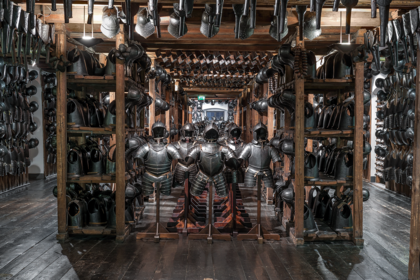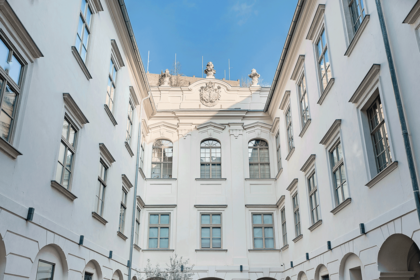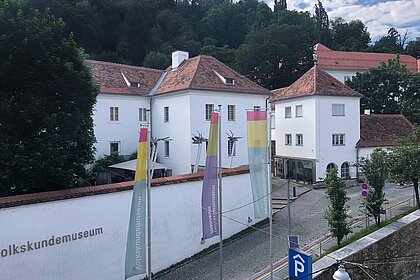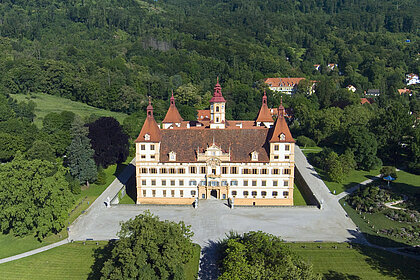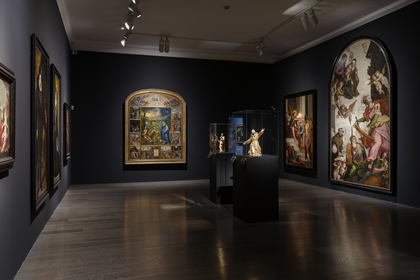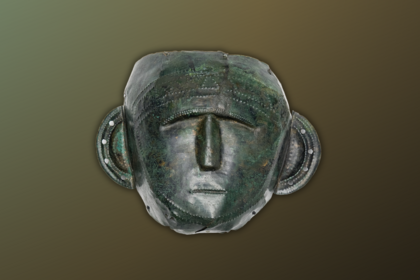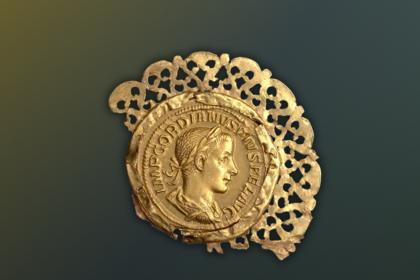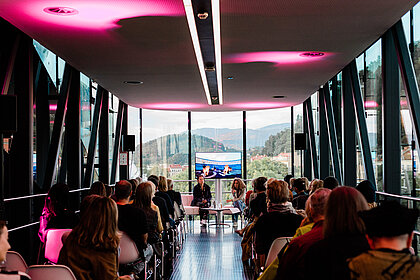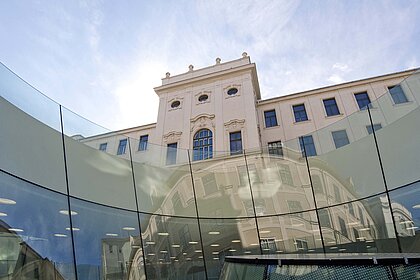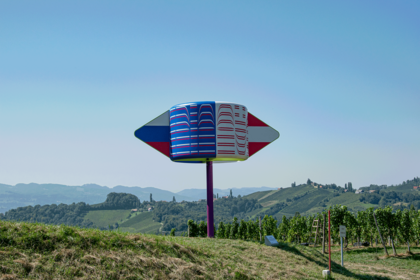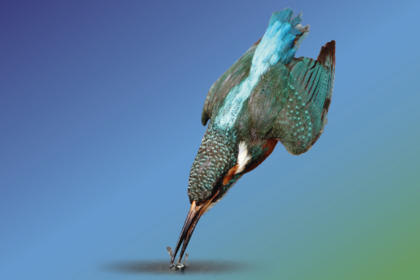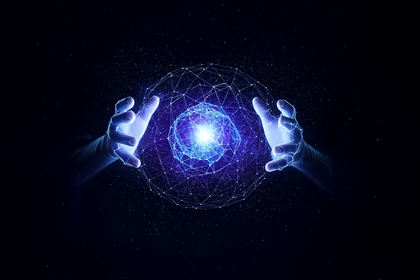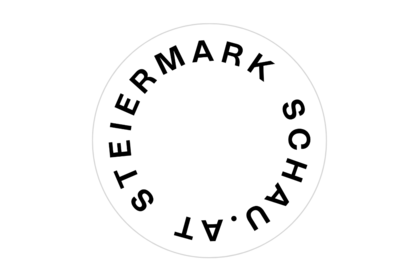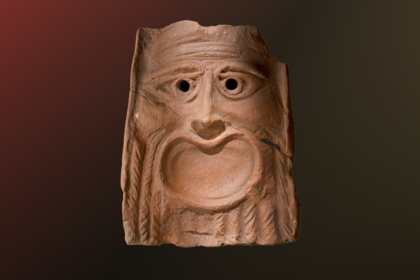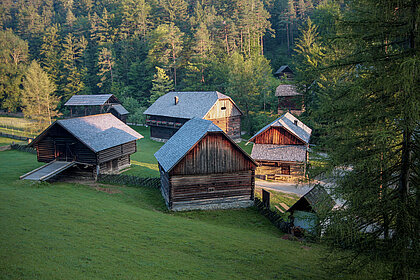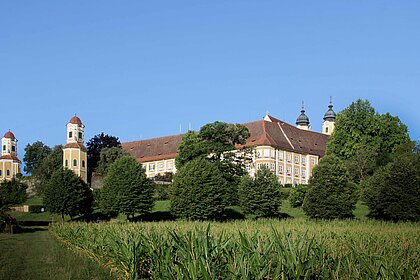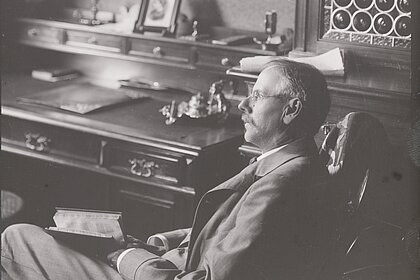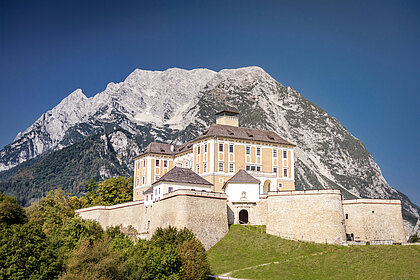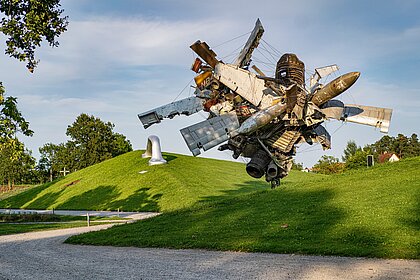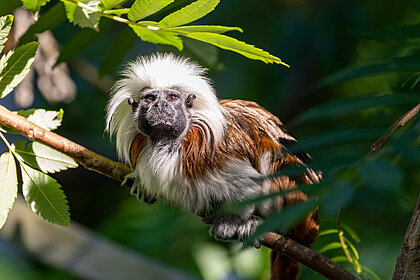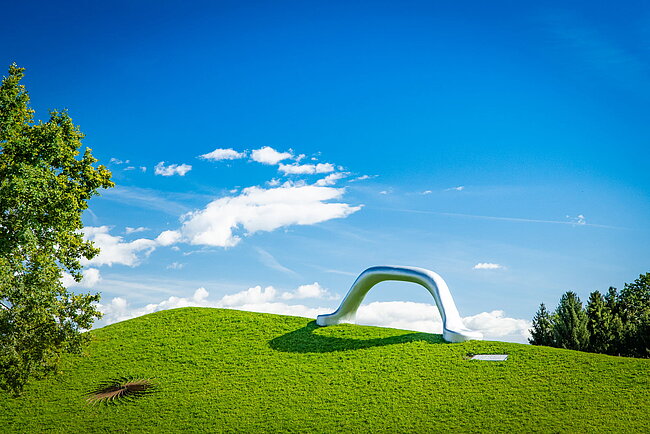Located seven kilometers south of Graz, the Austrian Sculpture Park has established itself as a center for contemporary sculpture since its founding in 2003. The fascinating park designed by landscape architect Dieter Kienast covers an area of around seven hectares and is a space for more than 80 sculptures to unfold. Works by renowned Austrian artists - from Fritz Wotruba and Franz West to Erwin Wurm, Heimo Zobernig and Michael Kienzer - communicate here with examples of international sculpture, for example by Jeppe Hein, Nancy Rubins, Tobias Rehberger and Susana Solano.
Images
Elisabeth Fiedler, Head of the department "Art in Public Space"
Universalmuseum Joanneum / J.J. Kucek
Herbert Boeckl, Atlantis, 1940-1944
Foto: Universalmuseum Joanneum/Markus Enzinger

Hans Aeschbacher, Figure II, 1955
Michael Schuster, Bildrecht Wien 2024

Gerhardt Moswitzer, Skulptur, 1961
Michael Schuster, Bildrecht Wien 2024

Joannis Avramidis, Figure III, 1963
Michael Schuster, Bildrecht Wien 2024

Heinz Leinfellner, Large dormant, 1964/65
Michael Schuster, Bildrecht Wien 2024

Fritz Wotruba, Large figure for Lucerne, 1966/67
Universalmuseum Joanneum, Nicolas Lackner © Belvedere, Wien

Josef Pillhofer, Hammurabi, 1970
Universalmuseum Joanneum, Nicolas Lackner

Bryan Hunt, Charioteer, 1982
Michael Schuster, Bildrecht Wien 2024

Fritz Hartlauer, Vertical extract from the primal cell, 1982/84,
Michael Schuster, Bildrecht Wien 2024

Marianne Maderna, Approaching Figure, 1984
Michael Schuster, Bildrecht Wien 2024

Oskar Höfinger, Now, 1986
Michael Schuster, Bildrecht Wien 2024

Tony Long, Natalexos, 1987
Michael Schuster, Bildrecht Wien 2024

Erwin Wurm, Bunker, 1987
Universalmuseum Joanneum, Peter Gspandl-Pataki

Christoph Lissy, Figure with ennclosed stone elements, 1988
Michael Schuster, Bildrecht Wien, 2024

Oswald Oberhuber, Basket, 1989
Universalmuseum Joanneum, N. Lackner

Ilija Šoškić, Sun of Steel, 1989
Jürgen Kriendlhofer

Ingeborg Strobl, Untitled, 1989/90
Universalmuseum Joanneum, Peter Gspandl-Pataki
![Ingeborg Strobl, Untitled, 1989/90 Two gravestones made of smooth stone. The inscription on the first: "Be patient". The inscription on the second: "With your own shadow" [inscriptions are translated from German].](/fileadmin/_processed_/d/e/csm_Strobl_Sei_geduldig_1989_90_Foto_UMJ_Gspandl-Pataki_02_16bf30d716.jpg)
Carmen Perrin, Untitled, 1990
Universalmuseum Joanneum, N. Lackner

Tom Carr, Open, 1991
Andrew Bush

Christa Sommerer, Phyllologia, 1991
Universalmuseum Joanneum, N. Lackner

Franz Pichler, Untitled, 1991/92
Andrew Bush

Lois Weinberger, Wall, 1992
Andrew Bush

Franz West / Otto Zitko, Who is Who, 1992
Universalmuseum Joanneum, N. Lackner

Erwin Bohatsch, Wall, 1992
Universalmuseum Joanneum, N.Lackner

Manfred Erjautz, The Silent Cell, 1992/94
Universalmuseum Joanneum, Markus Enzinger

Michael Kienzer, Untitled, 1992/94
Universalmuseum Joanneum

Karin Hazelwander, Perambulator, 1993
Universalmuseum Joanneum, N. Lackner

Sabina Hörtner, Untitled, 1993
Universalmuseum Joanneum, N. Lackner

Franz Xaver Ölzant, Fu and the beautiful Mandarin, 1993
Dieter Leitner

Richard Fleissner, Body part hurdles, 1994
Michael Schuster, Bildrecht Wien, 2024

Othmar Krenn, Partial sheathing, 1995
Universalmuseum Joanneum, N. Lackner

Martin Schnur, Untitled, 1995
Universalmuseum Joanneum, Peter Gspandl-Pataki

Susana Solano, Adjustment to the vacuum, 1995/1996
Universalmuseum Joanneum, C. Pötsch

Bruno Gironcoli, Untitled, 1995/96
Universalmuseum Joanneum/Markus Enzinger

Rudi Molacek, Rose, 1999
Michael Schuster, Bildrecht Wien, 2024

Erwin Wurm, Fat Car, 2000/2001
Andrew Bush

Jeppe Hein, Did I miss something, Exemplar 1/3, 2002
Andrew Bush

Hans Kupelwieser, Gonflable 6, 2002
Michael Schuster, Bildrecht Wien, 2024

Heinz Gappmayr, NOT YET VISIBLE - NO LONGER VISIBLE, 2003
Universalmuseum Joanneum, Markus Enzinger
![Heinz Gappmayr, NOT YET VISIBLE - NO LONGER VISIBLE, 2003 White lettering on a black background inside the wall of the sculpture park with the inscription "Nicht mehr sichtbar" [no longer visible]. On the other side of the wall on the grounds of the Schwarzl leisure center is the counterpart with the inscription "Noch nicht sichtbar" [not yet visible].](/fileadmin/_processed_/6/5/csm_Gappmayr_sichtbar_2003_Foto_Markus_Enzinger_db54e09c29.jpg)
Hans Kupelwieser, Bathroom, 1995/2003
Michael Schuster, Bildrecht Wien, 2024

Matt Mullican, Untitled, 2003
Universalmuseum Joanneum, N. Lackner

Michael Pinter, SUB/DC, 2003
Universalmuseum Joanneum, C. Pötsch,

Nancy Rubins, Airplane Parts & Hills, 2003
Dieter Leitner

Jörg Schlick, Made in Italy, 2003
Andrew Bush

Michael Schuster, Concrete boat, 2003
Michael Schuster, Bildrecht Wien, 2023

Hartmut Skerbisch, 3D Fraktal 03/H/dd, 2003
Andrew Bush

Thomas Stimm, Terranian Platform, 2003
Michael Schuster, Bildrecht Wien, 2024
![Thomas Stimm, Terranian Platform, 2003 The sculpture is a platform with the inscription "TERRA MY TERRA/PLANET SO SWEET/I CAN FEEL YOU/UNDER MY FEET". [inscriptions translated from german]](/fileadmin/_processed_/7/d/csm_Stimm_Terranian_Platform_2003_Foto_Michael_Schuster_2f8f66148e.jpg)
Heimo Zobernig, Untitled, 2003
Universalmuseum Joanneum, Markus Enzinger
Tobias Pils, Zog den Helfer unterm Teppich hervor, 2004
Foto: Universalmuseum Joanneum/N. Lackner
More images
Tobias Rehberger, Antisocial daughter, 2004
Tobias Rehberger, Bildrecht Wien

Werner Reiterer, gestures, 2003/04
Universalmuseum Joanneum, N. Lackner

Gustav Troger, Sample: Victory over the sun, the art of mocking nature, 2004
Universalmuseum Joanneum, N. Lackner

Peter Weibel, The globe as a suitcase, 2004
Johanna Lamprecht

Markus Wilfling, -3m board, 2004
David Auner

EVA & ADELE, watermusic, 2003/04
Michael Schuster, Bildrecht Wien, 2024

Yoko Ono, Painting to Hammer a Nail In /Cross Version, 2005
Universalmuseum Joanneum, B. Bauernfeind

Hartmut Skerbisch, Sphere 315, 2005
Universalmuseum Joanneum, M. Wimler

Matta Wagnest, Labyrinth, 2005
Michael Schuster, Bildrecht Wien, 2024

Peter Sandbichler, Tiger Stealth, 2009
Universalmuseum Joanneum, Peter Gspandl-Pataki

Giuseppe Uncini, Unità Cellulare, 1967/2008
Universalmuseum Joanneum, N. Lackner

Martin Walde, Siamese Shadow, 2003
Universalmuseum Joanneum, N. Lackner

Timm Ulrichs, Dancing Trees, 1997/2010
Roland Schmidt, Bildrecht Wien 2024

Mario Terzic, Ark made of living trees, 2010/2011
Universalmuseum Joanneum, N. Lackner

Wolfgang Becksteiner, Shift of Value, 2010
Universalmuseum Joanneum, N. Lackner

Hans Hollein, The golden Calf, 2011
Universalmuseum Joanneum, P. Gspandl-Pataki

Mandla Reuter, Untitled, 2013
Universalmuseum Joanneum, JJ Kucek

Manfred Wakolbinger, Placement (Giardini), 2012; Bildrecht, Wien 2024
Foto: Universalmuseum Joanneum/Peter Gspandl-Pataki

Peter Kogler, Untitled, 2014
Universalmuseum Joanneum, JJ Kucek

Class of Tobias Rehberger, Städelschule Frankfurt, Artist in Residence 2014, In Then Out, 2014
Universalmuseum Joanneum, JJ Kucek

Bernhard Leitner, Aspen Dome, 2015
Stefanie Baumann

Eric Kläring/Heimo Zobernig, Untitled (Projekt space/Platform), 2013/16
Universalmuseum Joanneum, Elisabeth Fiedler

Plamen Dejanoff, Pour féliciter, pour féliciter, pour féliciter, plamen, 2015
Universalmuseum Joanneum, Peter Gspandl-Pataki

Erwin Wurm, Fat House, 2003
Universalmuseum Joanneum, Birgit Bauernfeind

Gunter Damisch, DichteDichter II, 1991/2013
Universalmuseum Joanneum, Peter Gspandl-Pataki
Martin Gostner, Apparat für Park [Apparatus for park], 1991/2019
Martin Gostner, Bildrecht Wien, 2024
![Martin Gostner, Apparat für Park [Apparatus for park], 1991/2019 The work consists of oversized white cones made of absorbent cotton hanging high in the branches.](/fileadmin/_processed_/2/4/csm_Gostner_Apparat_199_2019_Foto_Martin_Gostner_fbbb929bb5.jpg)
Suchart Wannaset, Our Garden Fence, 2018
Suchart Wannaset, Bildrecht Wien, 2024

Chris Burden, Beehive Bunker, 2003
Universalmuseum Joanneum, Peter Gspandl-Pataki

Judith Fegerl, sunset, 2021
Universalmuseum Joanneum, JJ Kucek

Christoph Weber, sechs komma vier [six point four], 2021
Christoph Weber, Bildrecht Wien, 2023
![Christoph Weber, sechs komma vier [six point four], 2021 Six concrete stones in a row, modeled on the original limestone. Next to it, at the same distance, a 0.4-fold version of one of the stones.](/fileadmin/_processed_/1/2/csm_Christoph_Weber_sechskommavier_2021_Foto_Christoph_Weber_01_e9849a7fb4.jpg)
Boris Podrecca, EU & YOU, Object on the occasion of the 2004 enlargement of the European Union, 2004
Universalmuseum Joanneum, N. Lackner

Michael Schuster, FOR YOUR INFORMATION, 2024
Nadja Fuchs

Christian Kosmas Mayer, "Zeit, Zuwendung und Raum"
Foto: Universalmuseum Joanneum/J.J. Kucek © Bildrecht Wien, 2025

Mehr Fotos
Publication is permitted exclusively in the context of announcements and reviews related to the Austrian Sculpture Park. Please avoid any cropping of the images. Thank you for crediting the photographs according to the enclosed indications.
